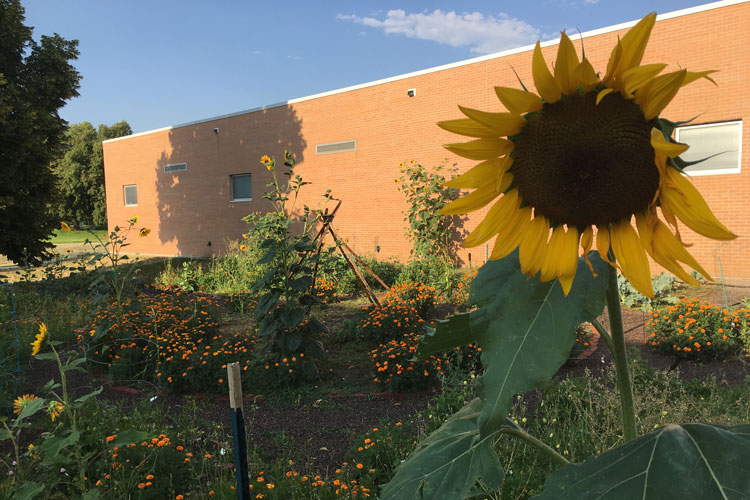
A new and improved TJ Spartan garden is here. photo courtesy of Elizabeth Lynch.
Students have the unique educational opportunity to operate the garden at Thomas Jefferson High School.
Thomas Jefferson High School has grown a garden for the past eight years. Each year, the preparations for the garden begin the the spring, but a group of DPS students in the Garden For Youth program take over in the summer while school is not in session. This year, there is a big push to transform the garden into an educational center for students by posting signage on the types of plants and specific information about each of them. TJ’s garden is also a part of a national program designed to attract bees and other pollinators that are crucial to gardening. Back in October, Denver Public Schools (DPS) certified the garden’s produce to be used in cafeterias in DPS.
Students in Mr. Croom’s class who work in the garden cultivate a variety of different plants, including peppers, watermelon, tomatoes, sunflowers, basil, lavender, pumpkins, corn, squash, beans, and others. All plants are started from seeds in TJ’s own greenhouse right after spring break ends and are then transplanted outside into the ground around a month later. Once the plants start producing, students from the Garden of Youth program sell produce at a farmer’s market on Denver’s Pearl Street Farmers Market. Students participating in the program also receive dual class and work credit.
Elizabeth Lynch, a WES Coordinator and AVID teacher has been indirectly involved with the garden since it started eight years ago. Special education teacher Paul Croom and his class operate the garden, but Lynch helps with marketing, overseeing plant sales, checking seed inventory, and keeping administration updated. She helped implement big changes to the garden with the educational components and the addition of a timed watering system. The garden will now have signs similar to ones at the Denver Botanic Gardens, educating students on the types of plants, how they grow in order to transform the green space into an educational center at TJ. “One of the reasons why the signs will be useful is because when students leave for the summer and then come back in the fall, the plants have went through changes and students sometimes can’t recognize which type of plant it is,” noted Lynch. She also explained how the timed watering system has helped sustain steady growth of the plants, which allows Garden of Youth students to sell more produce.
The garden also allows students to experience a real-world activity, spend time outdoors, and utilize skills they would not otherwise in a traditional classroom setting. Gardening builds better communication and problem-solving skills, which is extremely beneficial to students. A successful garden at TJ also requires lots of hard work and effort from everyone involved. Students must communicate amongst themselves and with teachers to plan a vision for the garden and to carry out the different roles for the upkeep. Sophomore Phabyan Longtree truly enjoyed his opportunity to previously work in the garden. In particular, he stated, “I liked working with dirt and different types of tools.” Students do not often receive the chance to work with their hands and get dirty, making it a unique experience for some students at TJ. Because of his great experience working in the garden, Longtree has applied to work in the Garden of Youth program.
TJ’s garden has been made possible by the hard work of many students and teachers who have passionately operated it for the past eight years. The garden becomes more and more successful each year and the new signage will transform the garden into an educational center. This unique opportunity allows students to explore different types of educational experiences in order to help them learn in new ways. It is especially impressive that the produce is certified for use in DPS kitchens. The TJ community can’t wait to see how the garden continues to evolve in the coming years.